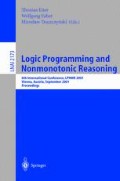Abstract
Default Logic is recognized as a powerful framework for knowledge representation and incomplete information management. Its expressive power is suitable for non monotonic reasoning, but the counterpart is its very high level of computational complexity. The purpose of this paper is to show how heuristics such as Genetic Algorithms, Ant Colony Optimization and Local Search can be used to elaborate an efficient non monotonic reasoning system.
Access this chapter
Tax calculation will be finalised at checkout
Purchases are for personal use only
Preview
Unable to display preview. Download preview PDF.
References
E. Aarts and J. K. Lenstra, editors. Local Search in Combinatorial Optimization. John Wiley and Sons, 1997. 318
P. Cholewiński, V. Marek, A. Mikitiuk, and M. Truszczyński. Computing with default logic. Artificial Intelligence, 112:105–146, 1999. 309, 319, 320
D. Corne, M. Dorigo, and F. Glover. New Ideas in Optimization. Mac Graw Hill, 1999. 316
M. Dorigo, E. Bonabeau, and G. Theraulaz. Ant algorithms and stimergy. Future Generation Computer Systems, 16:851–871, 2000. 316
G. Gottlob. Complexity results for nonmonotonic logics. Journal of Logic and Computation, 2(3):397–425, June 1992. 309
J. H. Holland. Adaptation in Natural and Artificial Systemes. University of Michigan Press, 1975. 313
T. Linke and T. Schaub. Alternative foundations for Reiter’s default logic. Artificial Intelligence, 124:31–86, 2000. 320, 321
Z. Michalewicz. Genetic Algorithms + Data Structures = Evolution Programs. Springer Verlag, 1996. 313
P. Nicolas, F. Saubion, and I. Stephan. Combining heuristics for default logic reasoning systems. In Proceedings of the 12th IEEE International Conference on Tools with Artificial Intelligence (ICTAI2000), 2000. 315
P. Nicolas, F. Saubion, and I. Stephan. Gadel: a genetic algorithm to compute default logic extensions. In Proceedings of the European Conference on Artificial Intelligence, pages 484–488, 2000. 310
I. Niemelä. Towards efficient default reasoning. In C. Mellish, editor, Proceedings of the International Joint Conference on Artificial Intelligence, pages 312–318. Morgan Kaufmann Publishers, 1995. 309
I. Niemeläs and P. Simons. Smodels-an implementation of the stable model and well-founded semantics for normal logic programs. In Proceedings of LPNMR, volume 1265 of Lecture Notes in Artificial Intelligence, pages 420–429, 1997. 320
A. Provetti and L. Tari. In Int. Genetic Evolutionary Computation GECCO’00, pages 303–308, 2000. 310
R. Reiter. A logic for default reasoning. Artificial Intelligence, 13(1-2):81–132, 1980. 309, 311
V. Risch. Analytic tableaux for default logics. Journal of Applied Non-Classical Logics, 6(1):71–88, 1996. 311
C. Schwind. A tableaux-based theorem prover for a decidable subset of default logic. In M. Stickel, editor, Proceedings of the Conference on Automated Deduction. Springer Verlag, 1990. 311
Author information
Authors and Affiliations
Editor information
Editors and Affiliations
Rights and permissions
Copyright information
© 2001 Springer-Verlag Berlin Heidelberg
About this paper
Cite this paper
Nicolas, P., Saubion, F., Stéphan, I. (2001). New Generation Systems for Non-monotonic Reasoning. In: Eiter, T., Faber, W., Truszczyński, M.l. (eds) Logic Programming and Nonmotonic Reasoning. LPNMR 2001. Lecture Notes in Computer Science(), vol 2173. Springer, Berlin, Heidelberg. https://doi.org/10.1007/3-540-45402-0_23
Download citation
DOI: https://doi.org/10.1007/3-540-45402-0_23
Published:
Publisher Name: Springer, Berlin, Heidelberg
Print ISBN: 978-3-540-42593-9
Online ISBN: 978-3-540-45402-1
eBook Packages: Springer Book Archive

